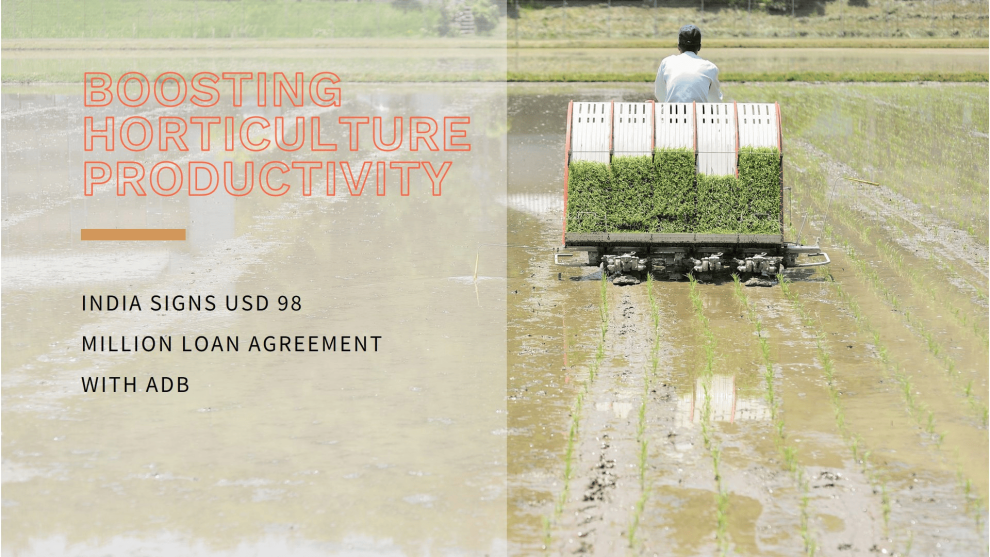In a significant move to enhance India’s horticulture sector, the Indian government and the Asian Development Bank (ADB) have signed a USD 98 million loan agreement aimed at increasing horticultural crop productivity and resilience. The agreement, which was formalized on Friday, is part of the “Building India’s Clean Plant Programme,” and is set to improve farmers’ access to certified disease-free planting materials, thereby boosting crop yields, quality, and resilience to climate change.
The Ministry of Finance stated that the loan will support the establishment of clean plant centres and the development of disease-free planting material systems, which are critical in improving agricultural productivity. These centres will include state-of-the-art laboratories for disease diagnostics and will be staffed by trained experts to maintain the quality of the foundation materials. The centres will also roll out a clean plant certification scheme that will help private nurseries ensure high-quality standards for planting materials available to farmers.
Strengthening Plant Health and Climate Resilience
The project, which aligns with the Government of India’s Atmanirbhar Clean Plant Programme (CPP), is designed to address critical challenges in the horticulture sector, particularly pest management and plant diseases. The programme aims to enhance plant health management systems, ultimately contributing to long-term sustainability and resilience against climate change.
Rising temperatures and extreme weather conditions are already impacting pest and disease behavior, creating significant challenges for farmers. With the new initiative, disease-free planting materials will help mitigate the adverse effects of climate change on crop production. The focus on plant health and disease management is also expected to provide farmers with the tools necessary to adapt to these changing conditions, thus improving their productivity.
Collaboration for Success
Juhi Mukherjee, Joint Secretary, Department of Economic Affairs, Ministry of Finance, highlighted the importance of plant health in increasing agricultural productivity, stating that ADB funding would play a vital role in promoting plant health management. Mukherjee emphasized that improved plant health is essential for boosting farmers’ yields and ensuring sustainable farming practices.
Kai Wei Yeo, Officer-in-Charge of ADB’s India Resident Mission, noted that the project’s goals closely align with the Atmanirbhar Clean Plant Programme, which aims to improve plant health management systems in India. He further added that the project would involve extensive consultation with private nurseries, state governments, researchers, and growers’ associations to ensure that the initiative is both effective and sustainable.
The Role of the National Horticulture Board and ICAR
The Ministry of Agriculture and Farmers Welfare will collaborate with the National Horticulture Board and the Indian Council of Agricultural Research (ICAR) to oversee the implementation of the project. The collaborative effort is expected to ensure that the initiative reaches its full potential, benefiting farmers across the country by providing them with high-quality, disease-free planting materials and fostering sustainable agricultural practices.
Anticipated Benefits for Indian Farmers
In addition to increasing crop productivity, the project’s focus on disease-free planting materials will help farmers address several challenges related to climate change. The increasing frequency of extreme weather events, along with changes in pest and disease behavior, makes it essential for farmers to have access to resilient crops. The new centres will play a crucial role in addressing these issues by providing certified, high-quality planting materials that can withstand these challenges.
This partnership between India and the ADB is a promising step towards achieving the nation’s goals of sustainable agricultural growth and climate resilience. By improving plant health and providing farmers with better resources, the initiative is set to have a lasting impact on India’s horticulture sector, contributing to the overall economic growth and well-being of rural communities.
The project is expected to play a pivotal role in revitalizing the horticulture sector, creating a more robust agricultural ecosystem that can effectively deal with the evolving challenges posed by climate change and pests, ensuring that farmers can thrive in an increasingly uncertain environment.












Add Comment